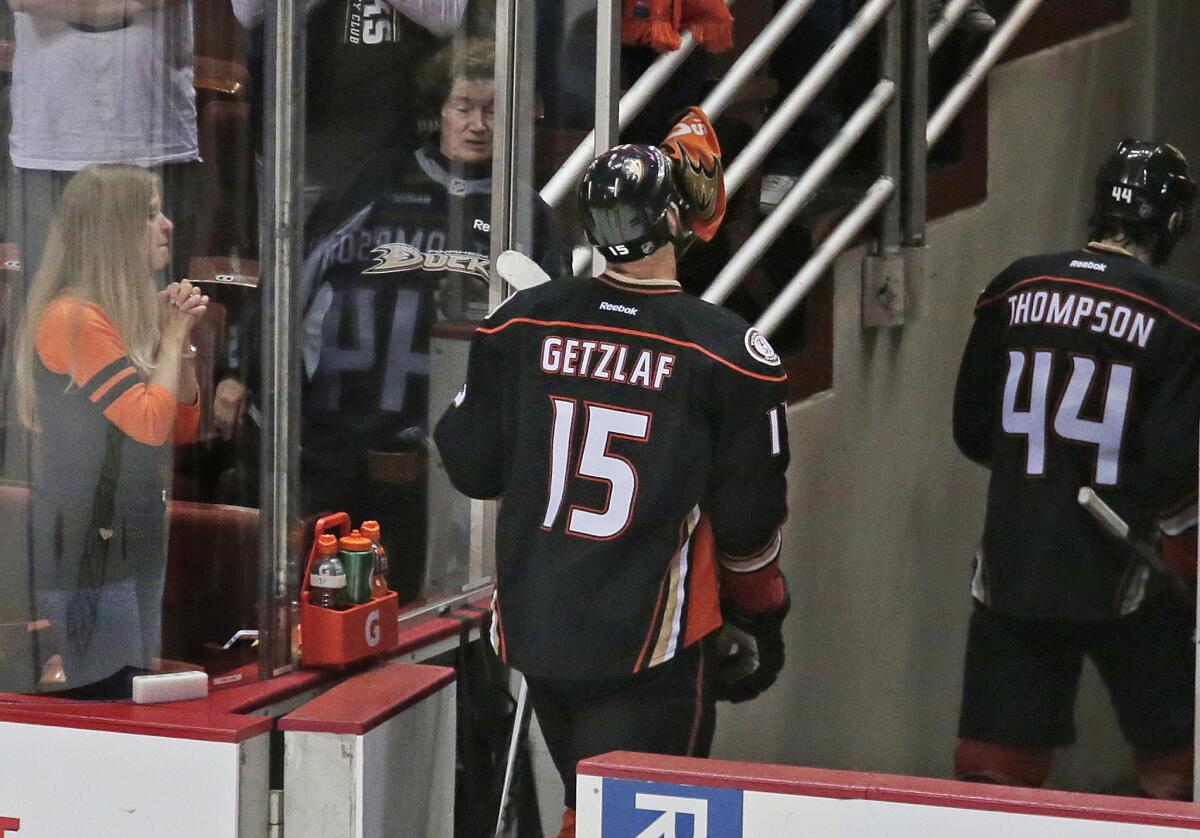Ducks have to find a reason for not reaching next level in postseason

- Share via
Ryan Getzlaf painted his Ducks teammates into a corner by refusing to admit the Chicago Blackhawks were the better team after winning the Western Conference finals.
By not accepting that the Ducks were beaten by a superior franchise positioned to win its third Stanley Cup in six seasons, Getzlaf brings attention to why his team squandered a 3-2 playoff series lead and lost Game 7 at home for an unprecedented third consecutive season.
If the reason wasn’t the Blackhawks’ talent — center Jonathan Toews scored four goals in the last three games, defenseman Duncan Keith had five assists in the final two and forward Patrick Kane closed with a goal and four assists in Games 6 and 7 — then the focus shifts to why the Ducks shrink in hockey’s most pressurized games.
“Last year was tough, but this is even worse,” Ducks forward Patrick Maroon said late Saturday in the type of candid conversation with reporters that should continue internally. “We’re making progress, but you don’t want progress. You want results.”
Anaheim’s 5-3 loss Saturday night at Honda Center came after the Ducks fell behind 4-0 just past the midway point of the second period, a fade to black watched by what NBC reported Sunday was a record audience both nationally and in the Los Angeles market for a non-Stanley Cup Final game.
“They showed what kind of team they are,” Ducks forward Andrew Cogliano said of the Blackhawks. “Their leaders … were making plays all night really.”
After saying he played “terrible” with a minus-three rating in Game 6, Getzlaf was minus-one with two giveaways in Game 7 while right wing Corey Perry matched those figures with a late third-period goal that was answered less than two minutes later by the Blackhawks’ dagger.
Perry declined to speak to reporters after the loss.
Getzlaf admitted of Game 6, “We weren’t really mentally prepared to play that game,” and lamented after Game 7, “they started stronger than us.”
The question to both statements is why.
Fingers will be pointed at Coach Bruce Boudreau’s 1-6 record in Game 7s — are his teams sensing some edginess and nervousness from him that they play with? — but more of the blame should go to the athletes.
Rather than finding a higher level, the Ducks were witness to Toews, Kane, Keith and Co. elevating their play in the moments of truth.
The Blackhawks move on to play the Tampa Bay Lightning in Florida on Wednesday in Game 1 of the Stanley Cup Final.
Anaheim’s response to its 2-0 hole wasn’t an impressive counterpunch. Instead, there was uncoordinated, uncharacteristic play that allowed odd-man rushes and a greater deficit.
“I don’t know if we went in the other direction,” Boudreau said, “but I do believe the Blackhawks got better.”
Blackhawks Coach Joel Quenneville called Toews “an amazing person, amazing hockey player. The bigger the stage, the bigger the setup, he just seems to excel.”
Ducks center Ryan Kesler, with a goal, five shots and eight hits in Game 7, could only do so much.
“It’s the start of summer now and we’re going to have to get over this and get ready for next year because I’ll tell you right now, this group is not done,” Kesler said. “We have unfinished business.”
That mind-set was supposed to have shaped this season, though, but it was Chicago which proved more resilient by responding to last season’s Game 7 overtime loss in the conference finals to the Kings.
“The team could really bear down and get back to playing the way we wanted to,” said Blackhawks forward Brad Richards, who’s now 7-0 in Game 7s. “That’s veteran leadership and a been-there, done-that type of thing. This series was no different … there was no panic.”
Where was the Ducks’ attention to keeping the puck down by Chicago goalie Corey Crawford in Games 6 and 7, imposing their physicality and attention to defensive detail?
Instead, the Ducks — who gave up 19 goals in the final four games — are left to take consolation in the fact they’ve moved from a first-round exit in 2013 to a conference semifinal loss to the Kings last season to this conference final defeat.
The Ducks will possibly be able to say they’ve taken the past two Stanley Cup champions to a Game 7.
“We can be proud of ourselves for what we accomplished this year,” goalie Frederik Andersen said. “But obviously no one’s satisfied not … winning the Cup.
“Tough trophy to win. [We gained] more experience for everyone to see how tough it is. … Long ride, but I feel like it’s over way before it’s supposed to.”
Certainly, Ducks General Manager Bob Murray will not take kindly to acceptance of anything short of the Cup from this cast.
Make no mistake, Murray knows his current roster is comprised of players who are a combined 7-48 in Game 7s, and he will respond accordingly.
More experienced defensemen could be pursued.
The Ducks, who have sufficient salary-cap room, will have to spend dearly to keep unrestricted free-agent forward Matt Beleskey from pursuing a likely bidding war for his services after his breakout season. Loyalty could allow for veteran defenseman Francois Beauchemin to stay in Orange County at age 35.
Young forwards Jakob Silfverberg and Emerson Etem are restricted free agents.
Murray has a history of moving boldly to replace those he believes fall short, so it’ll be intriguing to see what’s determined from a thorough re-examination of the postseason — particularly Games 6 and 7.
“We let the fans down and let the people around us down,” said defenseman Cam Fowler, who was on the ice for both of Chicago’s second-period goals.
Twitter: @latimespugmire
More to Read
Go beyond the scoreboard
Get the latest on L.A.'s teams in the daily Sports Report newsletter.
You may occasionally receive promotional content from the Los Angeles Times.







